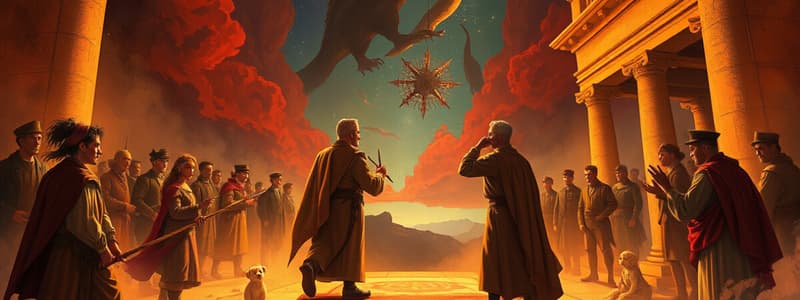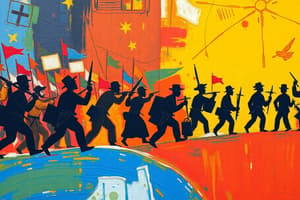Podcast
Questions and Answers
What does the term 'Gilded Age' most directly refer to?
What does the term 'Gilded Age' most directly refer to?
- An era characterized by rapid industrial growth and wealth disparity. (correct)
- A period of economic decline and poverty.
- A time when America was known for its moral failures.
- A phase where only the working class flourished economically.
Which of the following best describes the role of 'robber barons' during the Gilded Age?
Which of the following best describes the role of 'robber barons' during the Gilded Age?
- They were philanthropists who prioritized the welfare of the working class.
- They advocated for workers' rights and labor unions.
- They regulated industries to promote fair competition.
- They monopolized industries and accumulated wealth at the expense of society. (correct)
What was a significant outcome of the Industrial Revolution in terms of urban living?
What was a significant outcome of the Industrial Revolution in terms of urban living?
- It led to a decline in technological advancement and urban growth.
- It encouraged rural living over urban environments.
- It prompted the construction of fewer buildings and infrastructure.
- It increased the population living in cities, primarily due to job availability. (correct)
During the period from 1900 to 1912, how many new immigrants were added to the United States each year?
During the period from 1900 to 1912, how many new immigrants were added to the United States each year?
What were common push factors that led immigrants to leave their home countries during the late 19th and early 20th centuries?
What were common push factors that led immigrants to leave their home countries during the late 19th and early 20th centuries?
By 1920, what percentage of Americans lived in urban areas?
By 1920, what percentage of Americans lived in urban areas?
Which cities had populations exceeding 100,000 in 1890?
Which cities had populations exceeding 100,000 in 1890?
What was a characteristic challenge faced by immigrants in the late 19th century?
What was a characteristic challenge faced by immigrants in the late 19th century?
What was the primary role of the Buffalo Soldiers in the war referenced?
What was the primary role of the Buffalo Soldiers in the war referenced?
What did the Teller Amendment state regarding the U.S. involvement in the war?
What did the Teller Amendment state regarding the U.S. involvement in the war?
Which of the following accurately describes the Platt Amendment's restrictions on Cuba?
Which of the following accurately describes the Platt Amendment's restrictions on Cuba?
What was Teddy Roosevelt's major accomplishment regarding the Panama Canal?
What was Teddy Roosevelt's major accomplishment regarding the Panama Canal?
What significant outcome did the Treaty of Paris (1898) achieve for the U.S.?
What significant outcome did the Treaty of Paris (1898) achieve for the U.S.?
Which aspect of Roosevelt's foreign policy is illustrated by the Great White Fleet?
Which aspect of Roosevelt's foreign policy is illustrated by the Great White Fleet?
What did the Rough Riders primarily consist of?
What did the Rough Riders primarily consist of?
How did the Progressive Movement relate to the election of 1912?
How did the Progressive Movement relate to the election of 1912?
What was the primary reason for the establishment of the American Protective Association?
What was the primary reason for the establishment of the American Protective Association?
Which type of immigrants were primarily associated with Old Immigrants?
Which type of immigrants were primarily associated with Old Immigrants?
What architectural feature was common to dumbbell tenements?
What architectural feature was common to dumbbell tenements?
What was a significant impact of the Chinese Exclusion Act?
What was a significant impact of the Chinese Exclusion Act?
How did nativism manifest in American society during the period discussed?
How did nativism manifest in American society during the period discussed?
Why did the treatment of Chinese immigrants begin to change after World War II?
Why did the treatment of Chinese immigrants begin to change after World War II?
What was a significant event that influenced the start of the Spanish American War?
What was a significant event that influenced the start of the Spanish American War?
How did yellow journalism impact public perception during the lead-up to the Spanish American War?
How did yellow journalism impact public perception during the lead-up to the Spanish American War?
What demographic was largely affected by lynching in the South during the period described?
What demographic was largely affected by lynching in the South during the period described?
What role did Ellis Island serve in the immigration process?
What role did Ellis Island serve in the immigration process?
What was the primary promise made in the Teller Amendment during the Spanish American War?
What was the primary promise made in the Teller Amendment during the Spanish American War?
Who was known as 'General Butcher' due to his harsh tactics in Cuba?
Who was known as 'General Butcher' due to his harsh tactics in Cuba?
Why was President McKinley hesitant to go to war with Spain?
Why was President McKinley hesitant to go to war with Spain?
What was one result of the quick military success in the Spanish American War?
What was one result of the quick military success in the Spanish American War?
What was the significance of the de Lome letter in the context of the Spanish American War?
What was the significance of the de Lome letter in the context of the Spanish American War?
What role did Rough Riders play during the Spanish American War?
What role did Rough Riders play during the Spanish American War?
What was the main purpose of Upton Sinclair's novel, The Jungle?
What was the main purpose of Upton Sinclair's novel, The Jungle?
What significant legislation was influenced by Upton Sinclair's The Jungle?
What significant legislation was influenced by Upton Sinclair's The Jungle?
What was one of the tragic outcomes of the Triangle Shirtwaist Fire?
What was one of the tragic outcomes of the Triangle Shirtwaist Fire?
What role did Lewis Hine play in improving worker conditions?
What role did Lewis Hine play in improving worker conditions?
What practice was common in the meat packing industry during the time of The Jungle's publication?
What practice was common in the meat packing industry during the time of The Jungle's publication?
Which organization was developed to regulate railroad rates and practices?
Which organization was developed to regulate railroad rates and practices?
What was a major consequence of the Triangle Shirtwaist Fire?
What was a major consequence of the Triangle Shirtwaist Fire?
What aspect of society did Upton Sinclair aim to critique through his work?
What aspect of society did Upton Sinclair aim to critique through his work?
Flashcards are hidden until you start studying
Study Notes
Historical Debates Over History
- Purpose of history involves national pride versus moral reflection on America’s past.
- Historical relevance extends to contemporary societal issues.
Immigration/Rise of the City
- Gilded Age characterized by wealthy "robber barons" influencing economy, e.g., Rockefeller, Carnegie, Vanderbilt, J.P. Morgan.
- Industrial Revolution transformed urban living, making work accessibility easier.
- Significant immigration wave between 1880-1920, with 1 million new arrivals annually (1900-1912).
- Urban population grew from 20% (1859) to 50% (1920); cities expanded rapidly.
- Old immigrants primarily from Northern/Western Europe; new immigrants from Southern/Eastern Europe, often Catholic or Jewish.
- Ellis Island served as a primary entry point for European immigrants; Angel Island for those from the West.
- Nativism fueled discrimination against immigrants; American Protective Association formed in 1887.
- Chinese Exclusion Act restricted Chinese immigration following labor competition concerns.
- Lynching of African Americans justified by societal racism; horrific examples include Jesse Washington and Mary Turner.
Imperialism
- U.S. intervention in Hawaii involved the overthrow of Queen Liliuokalani.
- Cuban Revolution fueled by grievances against Spanish rule; U.S. involvement amalgamated with "yellow journalism."
- Spanish-American War sparked by events like the USS Maine explosion and the De Lome letter.
- Treaty of Paris (1898) established Cuba's independence and ceded territories like the Philippines to the U.S.
- Platt Amendment imposed restrictions on Cuba’s sovereignty, allowing U.S. intervention in politics and land leasing.
Progressivism
- Progressive Movement aimed at addressing social issues and implementing reforms.
- Teddy Roosevelt championed consumer protections and regulatory acts, spurred by muckrakers like Upton Sinclair.
- Significant events included the Triangle Shirtwaist Fire, revealing worker exploitation and leading to labor laws.
- Women's activism played a key role in social changes, focusing on uplift and greater rights.
- Election of 1912 showcased splits in the Republican Party, enabling Wilson's Progressive agenda.
- Pure Food and Drug Act established essential labeling requirements for food safety and sanitation.
Studying That Suits You
Use AI to generate personalized quizzes and flashcards to suit your learning preferences.




